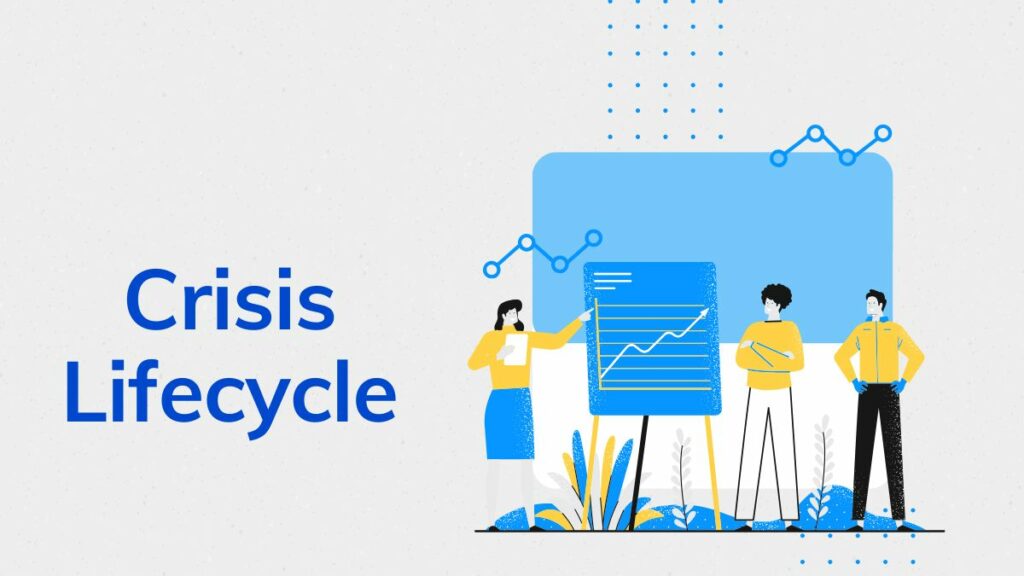Last updated on September 1st, 2025 at 05:14 pm
A crisis is an inherent characteristic of the contemporary business environment, as organisations can face unpredictable challenges. However, managing crises is possible by comprehending the lifecycle and applying appropriate tactics at various stages.
This article explores all crisis management phases to help you understand the process and potential recovery tactics. You will also learn about potential crisis response strategies from the perspective of a chief financial officer (CFO) and how this expertise can reshape crisis management tactics overall.
What is the Crisis Management Lifecycle?
Crisis management lifecycle is defined as the process through which organisations prepare for, respond to and renew themselves after experiencing a disruption. It highlights the significance of rigorous planning for several phases to avoid losses, maintain operational capabilities and restore confidence in the firm.
The structured development of these activities ensures that crisis management is more likely to be pre-emptive rather than reactive to these disruptive events, giving back control to the business whenever it is lost.
The Four Phases of Crisis Management Lifecycle
Every day, something poses huge challenges to companies’ operations, but to counteract these events, it is necessary to master the phases of managing crises. Here’s an in-depth look at the key phases that form the foundation for effective crisis management:
1. Mitigation and Prevention
In essence, this phase minimises the chances of risk occurrence by providing methods for managing the risk in question. Some organisations analyse risks, while others design alarm systems to prevent possible future issues from escalating into crises.
Key Activities:
- Identifying and assessing potential vulnerabilities
- Developing risk mitigation strategies
- Implementing internal controls and safety protocols
This crisis management stage aims to reduce the probability of crises and protect precious resources for supportive stability.
2. Preparedness
Once potential risks are identified, the next phase involves setting up response strategies. This phase ensures that all teams are trained, policies are in place, and tools are ready for swift action as and when needed.
Key Activities:
- Developing crisis management plans
- Training employees and conducting simulations
- Setting up communication channels for rapid alerts
Crisis preparedness reduces uncertainty and fosters confidence, both essential for an agile response.
3. Crisis Response
This phase involves executing planned strategies to contain the crisis and mitigate its impact. Swift decision-making, effective communication, and resource mobilisation are crucial for a successful response.
Key Activities:
- Activating crisis management teams
- Implementing communication strategies with internal and external stakeholders
- Making real-time decisions to control the situation
Strong crisis response strategies help minimise damage, control the narrative, and reassure stakeholders.
4. Recovery and Learning
The final phase focuses on restoring normalcy and evaluating what worked and what didn’t. This experience can be used to improve future crisis planning. Recovery also involves re-establishing trust with stakeholders and taking corrective actions.
Key Activities:
- Conducting post-crisis assessments
- Refining the crisis management framework based on lessons learned
- Rebuilding public trust and ensuring employee well-being
The recovery phase also includes assessing the financial impact after a crisis. This helps implement recovery plans that align with the company’s strategic goals.
The Role of CFOs in Crisis Management
During an economic crisis, chief finance officers are more than just managing the company’s funds and resources. They act as integral players and decision-makers who help organisations overcome the uncertainties that stem from crises by providing liquidity, working capital, and risk management options.
When managing potential disruptions that threaten operations, CFOs are the leading figures who drive an organisation towards financial stability and long-term success. If you, too, are hoping to acquire the prestigious responsibilities of chief financial officer, the CFO course at ISB can be an excellent starting point.
This course offers guidance on risk management, scenario analysis and strategic leadership to prepare future CFOs for any crisis. Connect with Imarticus Learning to learn more about the CFO programme!
Best Practices for Effective Crisis Management
Implementing the following best practices can help an organisation handle crises more effectively:
- Create a Dedicated Crisis Management Team: Assign clear roles and responsibilities.
- Establish a Communication Plan: Ensure smooth information flow amongst all stakeholders.
- Use Technology to Monitor Risks: Adopt AI-powered tools to detect early warnings.
- Document and Analyse Each Crisis: Use every crisis as a learning opportunity to improve future responses.
- Invest in Professional Development: Through targeted programmes, equip leaders, including CFOs, with the skills needed for strategic decision-making.
These practices contribute to building a resilient organisation capable of surviving and thriving through crises.
Conclusion
Understanding the crisis management lifecycle and the phases involved is important to manage uncertainty. Moving from the mitigation phase through response to recovery, each phase has its own set of probable threats and chances which must be anticipated, addressed, and managed. These responsibilities are even more essential for aspiring CFOs to understand as they help get in sync with new change-oriented duties and design financial plans.
Enrolling in the CFO course at ISB will open the relevant doors for professionals eager to upskill, as this programme introduces aspirants to confident leadership, risk management, and crisis-free strategies.

